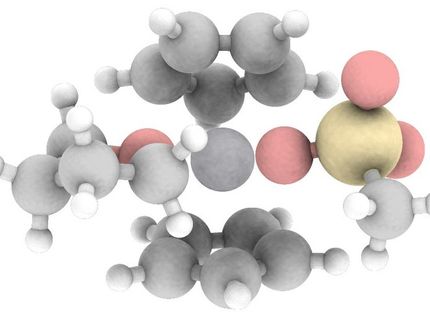New: An environmentally friendly chemical reaction that does not waste any atoms
Advertisement
In the Research Group of Nuno Maulide, a chemist working at the University of Vienna, a new chemical synthesis forα-arylated Carbonyl derivatives was developed. Members of this class of substances typically possess interesting biological and pharmacological properties and often find applications as medicines. The new technique developed by the Maulide group, which allows such Carbonyl derivatives to be generated easily, efficiently and in an environmentally friendly manner – without wasting any atoms –, has raised significant scientific interest and awareness. The corresponding publication in the journal Angewandte Chemie – International Edition was considered by the Editorial office as "highly important".
From accidental discovery to rational design
In Organic Chemistry one often encounters surprising experimental results, e.g. when new properties of compounds or new chemical reactions are unexpectedly discovered. The discovery of a new type of reactivity, i.e. the ability of a chemical substance to undergo a new type of reaction, can shine light on unforeseen and previously unknown interesting properties of that substance. Ideally, the chemist can then make use of the unexpected result and information to develop new transformations. The phenomenon whereby a scientist can make use of an unexpected result is often termed "Serendipity".
"Our initial, accidental discovery was an unusual transformation of amides – chemical substances that derive formally from the union of ammonia and carboxylic acids. In our current work, the addition of an activating agent generates a reactive intermediate, which subsequently undergoes an elegant rearrangement. During this rearrangement, the atomic constitution of the molecule is altered with atoms effectively changing place in a harmonious manner, leading to an entirely different product. We took advantage of the knowledge gained during that reaction for the development of the current Acid-catalysed Redox-Arylation. In other words, the information obtained during the study of that unexpected transformation allowed us to design novel useful transformations", says Nuno Maulide, since October 2013 Full Professor for Organic Synthesis at the University of Vienna. Maulide had published that original discovery in 2010 in the journal "Angewandte Chemie".
New: Only a catalyst is needed, and no additional reagents
In most organic chemical reactions a modification of the oxidation stage of the reagents takes place. Oxidations increase the oxidation state, whereas reductions decrease that oxidation state. Both types of reactions require the addition of an external reagent, either an oxidant or a reductant. In the new family of so-called "Redox-neutral", both steps – oxidation and reduction – take place simultaneously and concomitantly with the desired transformation. This renders additional reagents unnecessary. "The arylation that we have just developed requires only a catalyst; no other reagents are required", explains Langui Xie, co-author of the current publication and Post-Doc in the very international group of Nuno Maulide at the University of Vienna.
Sustainability: No atoms are wasted
New methods of synthesis for arylated Carbonyl derivatives are of considerable interest for the scientific community – not least due to the very important biological activities ofα-arylated carbonyls and their possible applications as medicines. Up to now, most methods employed for their preparation employed Transition-metal catalysed reactions, with the use of heavy metal reagents. This involves inevitable disadvantages such as product contamination, high catalyst costs and laborious and work-intensive reaction conditions. "The new transformation we developed requires no metals and belongs to the group of 'Atom-economical reactions'. Such transformations are notable in that all of the atoms of the reagents are expressed in the final products; thus, no atoms are wasted during the process", concludes the chemist Nuno Maulide.
Other news from the department science
Most read news
More news from our other portals
See the theme worlds for related content
Topic world Synthesis
Chemical synthesis is at the heart of modern chemistry and enables the targeted production of molecules with specific properties. By combining starting materials in defined reaction conditions, chemists can create a wide range of compounds, from simple molecules to complex active ingredients.

Topic world Synthesis
Chemical synthesis is at the heart of modern chemistry and enables the targeted production of molecules with specific properties. By combining starting materials in defined reaction conditions, chemists can create a wide range of compounds, from simple molecules to complex active ingredients.






























































